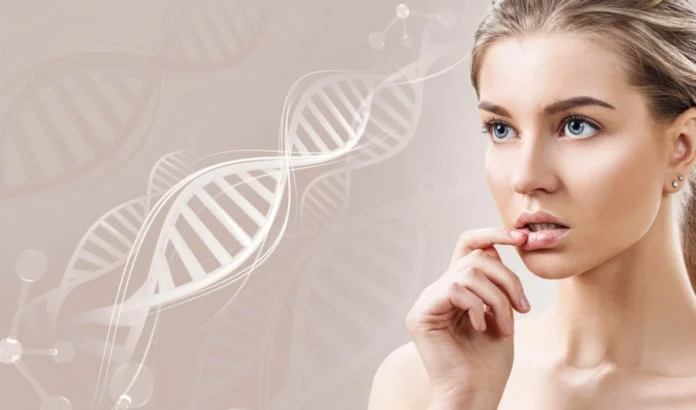Did you know that collagen is the body’s most abundant protein?
Collagen plays a vital role in many body systems, including joints, bones, and, most obviously, skin. Although collagen breaks down naturally with age, not everyone enjoys thin skin and wrinkles.
What is the importance of collagen for the skin? How does collagen affect the signs of aging? Most importantly, what can you do to protect and replenish collagen?
Please find the answers to all these questions and more in our detailed guide to Skin Collagen.
Why is collagen essential for the skin?
Collagen is a structural protein found in connective tissue, tendons, skin, bones, and cartilage. It provides support and strength to these areas and helps with tissue repair, cell communication, migration, and the body’s immune response.
Collagen plays a vital role in the health and function of your entire body. In addition to providing crucial internal support, collagen also greatly benefits the skin.
Collagen and elastin are essential proteins that give skin elasticity and elasticity. Collagen is produced throughout a person’s life but naturally decreases with age. At the same time, elastin levels peak in the womb and slowly decline with age.
Imagine a young child’s skin and how soft, plump, and firm it is. The kids’ skin is great because their collagen production is at its peak, and their elastin levels are still intense!
The benefits of collagen
Collagen gives skin strength and firmness. Maintaining high levels of collagen in the body is essential for maintaining healthy skin structures and preventing skin aging. Take collagen supplements and use collagen to protect your skin by:
- Improves skin elasticity
- Improves skin moisture
- Promote blood flow
- Heal wounds and to avoid scarring
- Prevent and reduce stretch marks
- Reduce visible cellulite
- Reduce dark spots
- Support self-esteem and reduce anxiety
What causes collagen loss?
Aging, poor diet, and certain autoimmune diseases, such as rheumatoid arthritis and lupus, all contribute to collagen loss. The most common cause is age.
After age 25, your body begins to slow down collagen production, although this function never completely disappears, like elastin. The natural decrease of collagen causes the skin to thin and wrinkles to deepen with age.
Other causes of collagen loss are easier to control. For example, people who smoke have more signs of premature aging due to weakened collagen and dry skin. Excessive alcohol consumption can also slow collagen production, limiting the skin’s ability to repair itself.
In addition to not smoking or drinking, you should also pay attention to your diet—processed foods containing sugar cause glycosylation, which prevents collagen from fully interacting with cells.
Sunlight is the biggest enemy of healthy, firm skin. When you go outside or sit in a sunny place, wear sunscreen and sunglasses to protect your face. Sunlight and ultraviolet rays degrade collagen, leading to accelerated skin aging.
What happens when you run out of collagen?
Collagen is one of the most important proteins in the human body and is needed in almost every system. When there is not enough collagen, you may notice some negative effects.
Unfortunately, aging is inevitable, so everyone will see some changes in their appearance. However, premature and apparent signs of aging are classic signs that your body needs more collagen.
When collagen reaches deficient levels, you may have a collagen deficiency. Collagen deficiency is a severe problem that must be addressed immediately. Signs of collagen deficiency include:
- Dry skin
- Delicate, thin skin
- Sagging skin and wrinkles
- Weak hair
- Weak nails
- Stiff joints
In severe cases, such as those caused by autoimmune diseases, a lack of collagen can lead to more severe problems. Serious problems caused by collagen deficiency include:
- An itchy, painful rash
- Joint and muscle pain
- Oral ulcer
- Open sore
- Sensitive, scalp shedding
- alopecia
- Cold numbness of limbs
Suppose you suspect you may have a severe collagen deficiency. In that case, it is essential to have your health evaluated by your doctor. Although you may have an autoimmune disease, collagen deficiency is something you can prevent and fix on your own in most cases.
Types of skin collagen
There are about 28 known types of collagen in the body. Type 1 collagen is the most common, accounting for 90% of all collagen in humans and animals. This collagen is easily obtained from a variety of animal and plant sources.
Finding the right collagen source or supplement can be challenging. Studies show that almost any collagen type is good for your skin, joints, and overall health!
Animal collagen
Collagen is not found only in humans. All living animals need collagen to support their bodies and structural systems. Some body parts contain more collagen than others; humans can get much of it by eating these animals.
For example, animals’ skin, joints, and bones contain large amounts of skin-promoting nutrients, including collagen. Bone broth, bone marrow, gelatin, and pig knuckles are common ways people eat animal-derived collagen.
We don’t usually pile these animal organs on a plate, but we can consume animal collagen in other ways. Don’t you want to eat any more pig knuckles? You can also easily find animal collagen in supplements and skin care products.
Marine collagen
Not all collagen comes from land animals. Fish and many Marine invertebrates, such as jellyfish, also provide some of the best collagen for skin. Some people take Marine collagen for religious, environmental, or personal reasons.
Marine collagen, also commonly referred to as fish collagen, is derived from fish, jellyfish, and other aquatic organisms. It is available in powder, pill, liquid, and topical forms. The body absorbs marine collagen in much the same way as collagen from land animals.
Plant collagen
Some collagen products are not suitable for vegetarians who refrain from using any ingredients of animal origin. Fortunately, there are plant-based collagen alternatives for those concerned about animal and environmental welfare.
The body does not easily absorb collagen from animal sources. Instead, the body breaks down animal collagen into essential amino acids and uses these to build new proteins.
Plant-based collagen supplements and topical ingredients focus on providing the same essential amino acids as animal collagen. These amino acids can come from any plant-based protein source, such as soybeans, beans, lentils, nuts, seeds, and mushrooms. Products containing snow algae powder are excellent natural collagen boosters for avoiding animal products.
How to protect collagen
Loss of collagen is inevitable as you age, but you can slow down the process and limit the changes in your body. Protecting the body’s natural collagen is essential to prevent the apparent signs of skin aging. Fortunately, you can take a few simple precautions to ensure your collagen levels stay as high as possible.
Stay hydrated
Drinking more water is one of the best things you can do for your skin. Water is like oil for the body, ensuring communication between cells, vitamin absorption, and smooth transportation of everything. In addition to drinking plenty of water, hydrate your skin from the outside with moisturizers and night creams daily.
Avoid the sun
There are many reasons why sunlight is terrible for your skin. It dries out the skin barrier, destroys cells, and breaks down collagen and elastin. Once these fibers are broken down, it takes a long time for your skin to regain its elasticity. Ensure you wear SPF30 or above daily and avoid sitting in the sun for long periods.
Stop smoking
Many people smoke to relax, but tobacco products may damage your skin and create more stress. The toxins in cigarettes destroy collagen and elastin, block blood circulation, and cause hyperpigmentation. If you are a smoker who is worried about your skin, it is necessary to reduce your smoking.
Pollution prevention
Did you know that air pollution damages your skin’s collagen? Air pollutants cause inflammation and produce free radicals in the skin, which break down collagen and cause wrinkles and sagging. You can only sometimes avoid high-pollution areas like downtown. Still, you can protect your skin by washing your face, exfoliating, and applying moisturizer and sunscreen daily.
Eat more antioxidants
Foods rich in antioxidants, such as blueberries, cherries, and dark leafy greens, are suitable for your skin and overall health. Antioxidants neutralize free radicals and prevent them from stealing your collagen. Foods that contain antioxidants also often add extra hydration and vitamin C, so stock up on your abundant produce!
Promote skin health
Use skincare products that protect the skin’s natural barrier and support collagen maintenance. Ingredients like retinol, vitamins C and E, and more work to support skin health and promote the body’s natural collagen production.
How to get more collagen
It’s important to protect the collagen you already have, but if you’re deficient in collagen, it won’t improve your skin’s elasticity much. In addition to taking the protective measures listed above, replenish collagen with these beneficial sources.
A natural source of collagen
You can boost your collagen levels without needing to use special supplements or concentrated creams. Choose firmer cuts of meat, like steaks and beef brisket, and incorporate collagen-rich foods like bone broth, fish skin, and gelatin into your diet.
If you don’t eat meat or you don’t like meat, look for foods rich in amino acids. Foods like fish, chicken, eggs, beans, tofu, and tempeh provide the basis for your body to produce more collagen. Collagen also requires nutrients like zinc, vitamin C, and vitamin E, so make sure you get the recommended amount daily!
Skin collagen supplement
Keeping track of collagen intake through food can feel like a full-time job. Fortunately, it’s much easier to boost collagen with the help of oral supplements. Repairing your skin from the inside out is one of the best ways to ensure long-term skin health and collagen retention!
Look for anti-aging supplements containing ingredients such as Moldavia Faucet extract, vitamins C and E, and natural collagen. Incorporate oral supplements into your daily morning routine, and you’ll see excellent results that will last a lifetime!
Skin care products containing collagen
For beautiful skin, just dab on a night cream! Heal your skin from all angles with skin care products that promote and protect collagen. External skin care is as essential as internal health to preserve and increase collagen production.
Buy beauty creams that contain natural ingredients such as red algae extract, snow algae powder, shea butter, and ginseng root. These carefully selected breakdowns lock the cell renewal process, reducing wrinkles and plump, firming skin.
Supports healthy, glowing skin
We cannot emphasize the importance of collagen to our skin enough. Collagen is essential for skin health and structural support and for beauty from the inside out.





